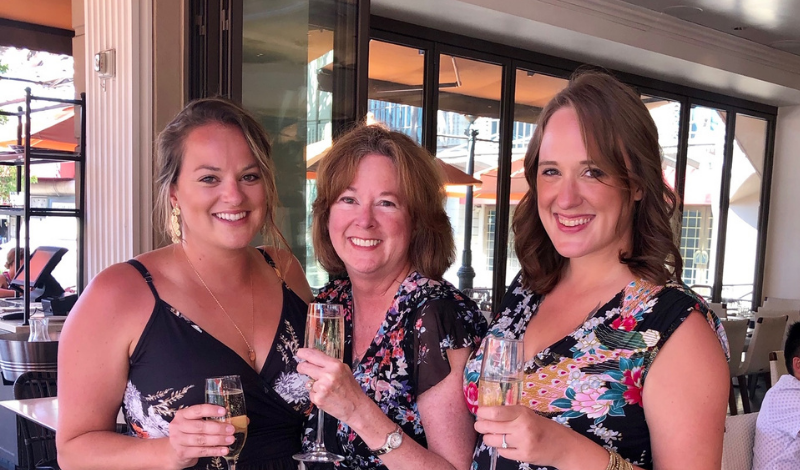
Carol Brickell passed peacefully, surrounded by her family on Friday, December 31, 2021. She was a lovely, cheerful lady who was always looking for ways to make a difference. Lung Cancer Foundation of America is so grateful for the time we got to spend working on lung cancer advocacy together. Always bringing sunshine to LCFA’s Speakers Bureau, we are so sorry to lose her.
Here is her Living With Lung Cancer story she shared with us in July 2020.
Carol Brickell’s Story: Self Advocacy Revealed A Life Changing Diagnosis
In November, 2018, Carol Brickell – along with her husband and co-workers – developed a cough. It was winter, everyone around her was coughing and, for a while, she didn’t think much of it. When the cough persisted, however, she visited her doctor who prescribed antibiotics. When the antibiotics proved worthless against the cough, she returned not once, but twice, to be evaluated. By now, her cough had become more intense, and she knew something was wrong. During the third visit, she began what would become a path of self-advocacy: she pushed hard to get the doctor to agree to further testing. An x-ray and CT scan lit up.
By now it was December. Carol called a Pulmonologist who initially offered her an appointment a month later. Again, she advocated for her health and was seen within days, New Year’s Eve day to be precise. A biopsy would show malignant cells in her lungs and she was referred to an Oncologist. Carol was diagnosed with Advanced Stage Non-Small Cell Lung Cancer. Fortunately, her Oncologist was familiar with biomarker testing and put things in motion immediately. The result: ROS1-positive Lung Cancer.
After learning that surgery was not an option, Carol recalls asking the doctor if treatment was even worth doing. His response: “Oh, yeah. I have a plan.”
Within days, thanks to the swift actions by her Oncologist, Carol began a treatment plan of immunotherapy and chemotherapy. Within two weeks, she was feeling better. By the time she had her first 3-month scan, everything had shrunk by nearly 50% and when summer arrived, she felt “nearly normal.” So much better, in fact, that she traveled to California to visit family and took a celebratory trip to Las Vegas with her two grown daughters.
Throwing a Wrench into “Nearly Normal”
In December, Carol began experiencing pain in her abdomen. This was concerning as it could be indicative of either further lymph node involvement, a side effect of the immunotherapy, or more cancer. In the days leading up to Christmas, it was decided to stop all treatment. Within weeks the abdominal pain had increased, back pain started, and lymph nodes on the neck were visible to the eye. Again, advocating for herself, Carol reported the symptoms to her doctor and he came up with a new treatment plan.
On February 1st, Carol began oral targeted therapy for her ROS1 biomarker. On June 1st, just four months later, her CT scan was clear: lymph nodes resolved, nodule in lung gone, no evidence of disease anywhere.
From Advocating For Her Health to Advocating For Others
As her lung cancer journey unfolded, Carol, an HR and Recruiting professional, fast-tracked her retirement by a few years and became a Certified Career Coach. Now, she helps people with their resume writing, interview skills, and career transition. She has also become an outspoken advocate for lung cancer research by writing letters to her congressmen, giving speeches, and sharing her story with other lung cancer patients.
“I’ve adopted certain practices which have served me well. It is all about being in tune with your whole being: mind, body, and spirit. For my mind, I work hard to stay in the present moment. For my body, I take walks and do Tai Chi and yoga every day. And for my spirit, I celebrate my family and church, and focus on a sense of purpose and volunteer my time to help people find jobs. It is how I have positively dealt with the lung cancer experience.”
Carol is one of our newest members of the LCFA Speakers Bureau. She lives in Dallas, Texas with her husband and loves spending time with her two adult daughters and her four grandchildren.
A Note About Carol’s ROS1 Biomarker
The least common of the lung cancer biomarkers, ROS1 occurs in approximately 1-2% of patients with non-small cell lung cancer, tends to be aggressive and can spread to the brain and the bones. Patients with a ROS1 rearrangement respond well to some of the same treatments that are used to treat ALK-positive lung cancer patients. This information, which helps to prolong and improve upon mortality rates, came to be known as a direct result of research. This discovery demonstrates the importance of funding dedicated to not just lung cancer, but its various biomarkers.
It is also thanks to research that we now understand that ROS1-positive lung cancer patients tend to be:
- younger than average
- test negative for ALK and EGFR
- women more often than men who have either never smoked or had smoked a little
We cannot stress enough not only the importance but the value of biomarker testing. And, remember, it is through ongoing research that biomarkers and their treatments are possible.

